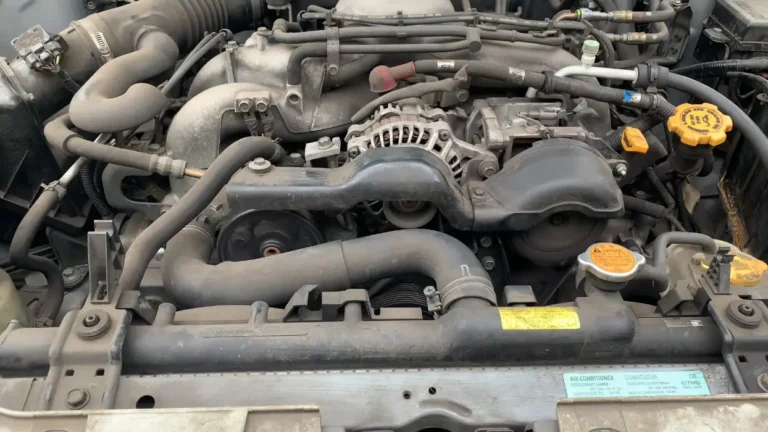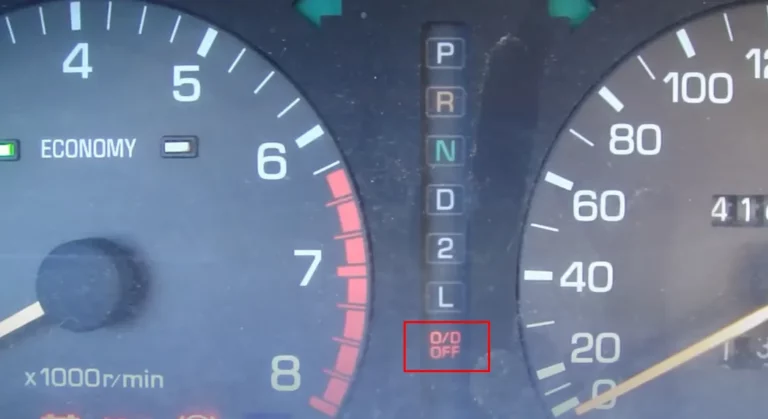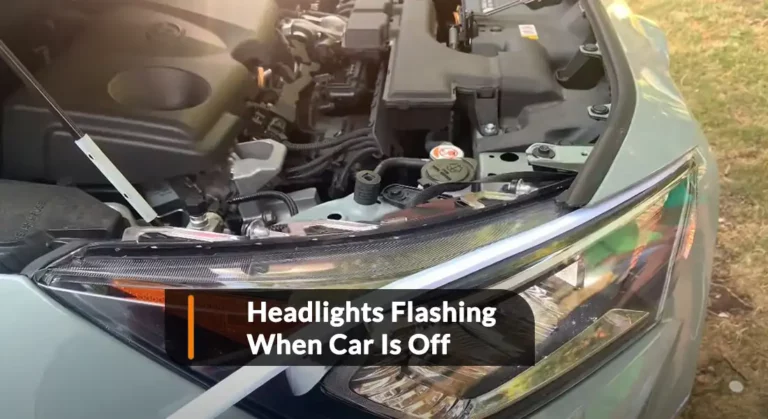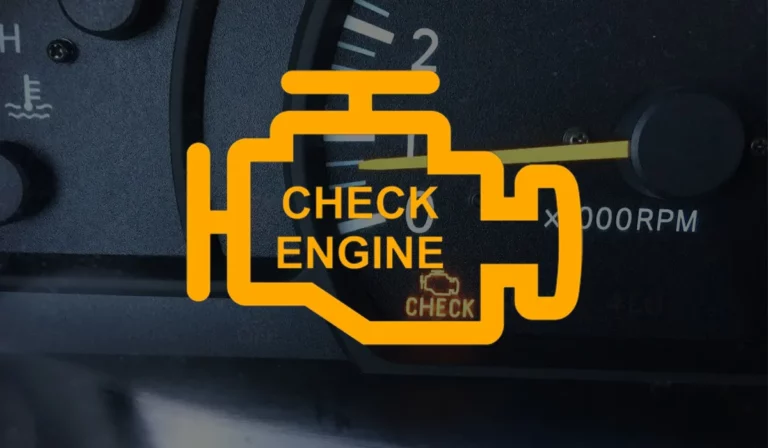Rubbing Noise from Front Wheel When Driving – Here’s What to Do!
When you’re driving your vehicle, unexpected noises can be concerning and indicate potential problems that require attention. One common issue many drivers experience is a rubbing noise coming from the front wheel.
A rubbing noise from front wheel when driving indicates that there is unwanted contact or friction occurring between components of the wheel, brake system, suspension, or tires
This noise can be irritating, and more importantly, it may signal an underlying mechanical or safety issue that needs to be addressed promptly.

Why Should You Pay Attention To Car Noises?
As a responsible car owner, it is important to pay attention to the various noises that your vehicle makes. This practice is not only essential for ensuring the safety of yourself and others on the road, but it also plays a significant role in maintaining the reliability and longevity of your car.
Unusual sounds may indicate a problem that, if ignored, will require costly repairs. While your car may not be able to speak, it may communicate clearly through the sounds it creates.
Vehicle noises may be diagnostic. Several sounds can indicate car problems. Squealing or grinding brakes may indicate worn brake pads or rotors.
Monitoring car noises aids preventive maintenance as well. Investigating strange noises can prevent major issues.
Why Is There A Rubbing Sound Coming From The Front Wheel While Driving?
The rubbing noise indicates that there is undesired contact or friction between particular parts, which causes the sound.
Typically, the rubbing noise from the front wheel indicates mechanical problem or failure in the vehicle’s braking systemprimarily a result of brake caliper and rotor friction or a bad wheel bearing.
Worn dust shields touching the brake rotor, damaged, worn, or loose wheel bearings, and deteriorated suspension parts could also cause the rubbing noise from the front wheel while driving.
What Causes A Rubbing Noise From Front Wheel When Driving?
1. Bad brakes
Wearing brake components can produce a grinding or rubbing sound, indicating a problem with the brakes. The metal backing plate can make contact with the rotor when the brake pads wear down, causing the noise.
When you begin to notice that your brake responds more slowly than it should, you will realize that it is worn out. There are numerous parts to a brake, and they must all work together for it to function properly.
- Caliper
The caliper squeezes the brake rotor, slowing the vehicle. Road debris, emergency stops, and corrosion are all potential threats. There will be a rattling or rubbing sound when you apply the brakes if the caliper is failing.
- Rotors
The rotors are responsible for preventing the wheels from rotating when the brake pads are depressed. Damage to the rotors can occur through excessive use of the brakes, sudden stops, or using the brakes while they are not in good working order.
- Brake Pads
When the brakes are engaged, the brake pad presses down on the rotor. The pads will need to be replaced at some point due to normal wear and tear. A faulty brake pad will make a squeaking noise whenever the car comes to a halt.
2. Wheel bearing and CV joint issue
Wear and tear on the wheel bearing, which permits the wheel to rotate smoothly, can cause the wheel to become noisy and cause friction. It iscritical because it can cause wheel misalignment or even wheel detachment if left neglected.
The wheels and the vehicle’s transmission system are connected by the CV joints.The intermittent rubbing sounds from the front wheel can be a sign of a corroded or under-lubricated CV joint.
3. Suspension problems
Rubbing or squeaking sounds can be caused by worn bushings, struts, or control arms. The rubbing noise is caused by the wheel’s uneven movement, which can be caused by faulty suspension components.
4. Fender/wheel liner interference
Tire interference with fenders or wheel liners can occur if either is broken, loose, or improperly positioned on the vehicle. This friction can cause a rubbing sound that is accentuated at slow speeds or while swerving.
5. Defective Tires
Tires can make rubbing or scraping noises when they rotate if the tread is severely worn, worn unevenly, or if there is a bulge or bubble on the tire sidewall.
6. Other Possible Causes
In addition to the aforementioned causes, drive rubbing noises can also be caused by:
- Incorrect installation of brake parts such as pads, calipers, or discs.
- The brake pad’s metal components are rubbing against something.
- Tires not properly mounted.
How To Fix A Rubbing Noise From The Front Wheel When Driving?
Step-1 Raise the Vehicle Off the Ground
The vehicles need to be raised off the ground so that any problems can be thoroughly inspected. A mechanical jack is essential for this phase since it helps us see the underneath of the vehicle more clearly.
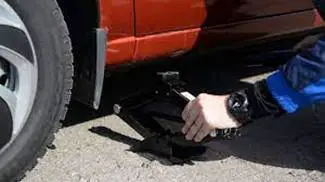
Step-2 Examine the Brakes for Signs of Wear
Examine the rotor of your brakes and the pads where they are located in this area for any obvious signs of wear or damage.
- Check brake pad thickness. They need enough friction material. Replace worn pads. Replace worn or improperly positioned brake pads.
- Inspect the brake rotors for signs of damage like grooves, scoring, or warping. Resurfacing or replacing rotors may be necessary.
- Check for leaks and rust in the calipers. Check caliper pistons for sticking. Tighten caliper bolts and mounting hardware.
- Inspect the brake lines for any signs of leaks, cracks, or damage. Leaky brake lines can impair braking.
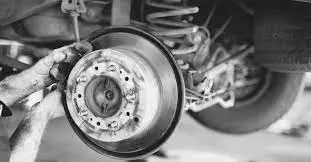
Step-3 Check The Tires And Wheel Bearings
Look for any damage in the tires and wheel bearings.
The Tires
This is the most obvious and easily repairable part.
- If the tires are low on air, use air pumps to get them back up to pressure.
- If the tires go flat, gets punctured or is otherwise rendered unusable you will be needing a spare tire.
- If air is escaping from the tires, you can fix them by re-seating the leaking location.
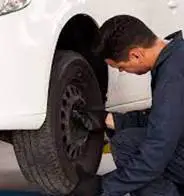
Wheel bearing
Over time, excessive load on the bearings might cause them to thin out. A grinding or scraping noise may result from this. It is important to check the wheel bearings to see whether
- they have become loose,
- if adequate lubricant has been applied,
- check if there is any play in the wheel bearings.
If you don’t know how to fix these problems yourself, you should take your car to a service shop.
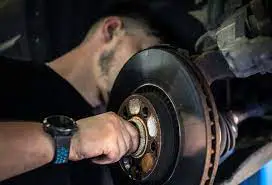
Step-4 Check the dust shield
The dust shield protects the suspension and drivetrain from braking system heat. This cover also protects brake pads, rotors, and calipers from water and debris.
If worn and strained, replace this metal sheet.Additionally, clean all dust, dirt, and stones in all components since these may be little troublemakers causing the sounds.
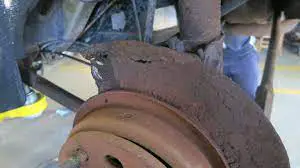
Step-5 Check whether the Rubbing Sound Is Still There by Driving
After carefully pulling the dust shield away from the rotor, a test drive can reveal whether or not the scraping noise has been eliminated. If it hasn’t happened already, you should probably replace the rotor and the pads.
How Much Does it Cost to Repair Rubbing Noise From Front Wheel When Driving Problem?
A dust shield or backing plate can cost anywhere from $30 on the low end to over $150 on the high end for a complete set.
Wheel bearing and hub assemblies can range in price from $20–$30 to above $500 per set, depending on the vehicle.
Brake parts, like hubs and bearings, can range in price from as little as $20 to well over $100, depending on the vehicle.
Depending on the extent of the damage, hiring a mechanic to fix it might set you back well over $100.
Is It Dangerous To Drive With A Front Wheel That Makes A Rubbing Noise?
Noises like grinding and rubbing frequently occur in the car. However, many of us ignore that issue because we believe it to be little.
Even though this is a common problem, it may indicate a significant problem with your car’s mechanics.
Rubbing noises often indicate problems with the brake system or other critical components, which can impair braking performance, cause more damage, and influence vehicle stability and control.
Driving in such conditions raises the danger of accidents and requires rapid inspection and repair by an expert.
Related articles:

